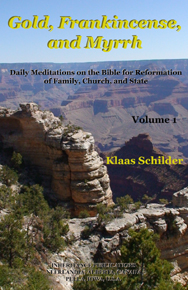
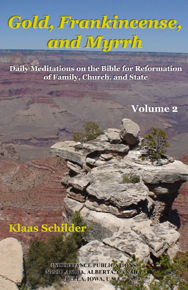 Gold, Frankincense,
Gold, Frankincense,

 Gold, Frankincense,
Gold, Frankincense,
and Myrrh
Daily Meditations on the Bible
by Klaas Schilder
"For whoever has, to him more will be given." For this reason the wise men came to honour the King with gold, frankincense, and myrrh. But that was only at the hour of promise. Promises are not expensive. Yet, how God tested them when they found the Child! There was no throne for Him. And there were no people either. Their star did not rest above a palace. Then in their hearts they thought of another truth, "Whoever does not have, even what he has will be taken away." They would not have said it in these words, yet the question would have burned in their hearts, "Should we take the treasures back again? The King is not what we dreamt . . ." But God overcame them: they truly opened their treasure bags for Him and all was indeed for Him! The wise men understood that it is easy to imagine giving gifts to a Lord of our imagination, but it is difficult to give treasures to a King who makes no effort to be as we considered Him to be.
— from the meditation of January 1
4 volumes
CAD$49.95
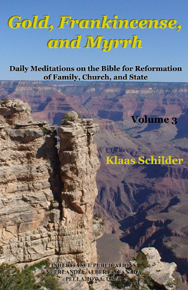
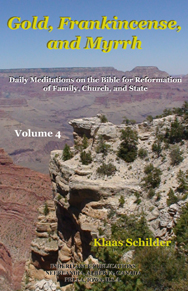
E-Books & Audio books
![]()
to order the E-Book email us at
ebooks@inhpubl.net and put
E-Book of all 4 volumes Gold, Frankincense, and Myrrh by Klaas Schilder
CAD$11.95
in the subject line
![]()

 to order
the Audio Book email us at
to order
the Audio Book email us at
ebooks@inhpubl.net and put
Audio Book of all 4 volumes Gold, Frankincense, and Myrrh by Klaas Schilder
CAD$19.95
in the subject line
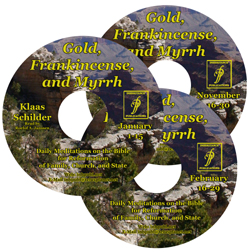
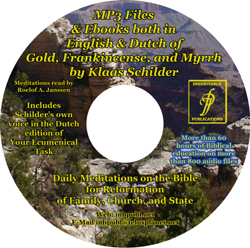 Audio Book on
24 Compact Discs CAD$69.95
Audio Book on
24 Compact Discs CAD$69.95
DVD-ROM with MP3 Files & Ebooks
with both the English and Dutch editions of Gold, Frankincense, and Myrrh
met zowel de Nederlandse en Engelse edities van Goud, Wierook en Myrrhe
by / door
Klaas Schilder
More than 60hours of Biblical education on more than 800 audio files
(includes also all complete articles on MP3 files -- undivided -- of the longer mediatations that are divided for the daily meditations)

 All
Meditations are read in Dutch and English by Roelof A. Janssen
All
Meditations are read in Dutch and English by Roelof A. Janssen
Includes Schilder’s own voice in the Dutch edition of Your Ecumenical Task
Heeft ook een MP3 versie van de originele toespraak van Klaas Schilder
Uw Oecumenische Taak, zoals uitgezonden in 1951 op de Radio
CAD$29.95
SCHILDER, KLAAS - GOLD, FRANKINCENSE, MYRRH - VOL. 1 - 9781894666848 - CAD$ 13.95

 SCHILDER, KLAAS -
GOLD, FRANKINCENSE, MYRRH - VOL. 2 - 9781894666855 - CAD$ 13.95
SCHILDER, KLAAS -
GOLD, FRANKINCENSE, MYRRH - VOL. 2 - 9781894666855 - CAD$ 13.95
SCHILDER, KLAAS - GOLD, FRANKINCENSE, MYRRH - VOL. 3 - 9781894666862 - CAD$ 13.95
SCHILDER, KLAAS - GOLD, FRANKINCENSE, MYRRH - VOL. 4 - 9781894666879 - CAD$ 13.95
by Klaas Schilder read by Roelof A Janssen Translated from the Dutch into English. The original Dutch version is also available on CD and included on both the above-mentioned DVD and the DVD with PDF files of De Reformatie. “. . . so good, so encouraging, so Scriptural, the best speech I’ve ever heard.” Also included on CD: Stigmatized & Princes and Nobles by Klaas Schilder CAD$6.00 |
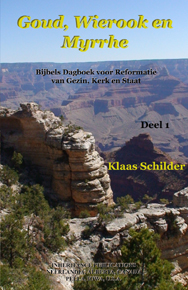
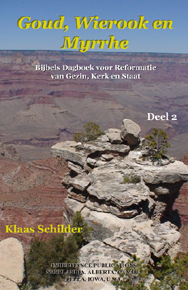 Nederlandse
Editie / Dutch Edition
Nederlandse
Editie / Dutch Edition
Nederlandse Editie / Dutch Edition
SCHILDER, KLAAS - GOUD, WIEROOK & MYRRHE 4 DELEN SET -
9781894666350 - CAD$ 59.95
![]()
Luisterboek
to order the Audio Book email us at
ebooks@inhpubl.net and put
Audio Boek SCHILDER, KLAAS - GOUD, WIEROOK & MYRRHE- Dutch Edition US$15.95
in the subject line
![]()
to order the E-Boek email us at
ebooks@inhpubl.net and put
E-Boek SCHILDER, KLAAS - GOUD, WIEROOK & MYRRHE- Dutch EditionUS$9.95
in the subject line
SCHILDER, KLAAS - GOUD, WIEROOK & MYRRHE 4 DELEN SET -
9781894666350 - CAD$ 59.95
SCHILDER, KLAAS - GOUD, WIEROOK & MYRRHE DEEL 1
9781894666251 - CAD$ 17.95
SCHILDER, KLAAS - GOUD, WIEROOK & MYRRHE DEEL 2
9781894666268 - CAD$ 17.95
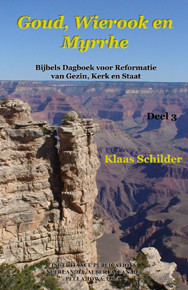
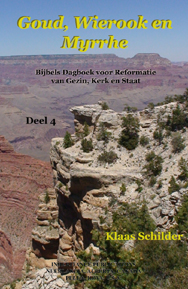 SCHILDER,
KLAAS - GOUD, WIEROOK & MYRRHE DEEL 3
SCHILDER,
KLAAS - GOUD, WIEROOK & MYRRHE DEEL 3
9781894666275 - CAD$ 17.95
SCHILDER, KLAAS - GOUD, WIEROOK & MYRRHE DEEL 4
9781894666282 - CAD$ 17.95
December 27
The Language of the Spirit and the Bride (1)
And the Spirit and the bride say, "Come!" — Rev. 22:17.
Read: Rom. 8:18-27 Sing: Ps. 90:1
"For we do not know what we should pray for as we ought . . ." And we do not know what we should pray for on New Year’s Eve as we ought.
". . . but the Spirit Himself makes intercession for us with inexpressible sighings." And the Spirit Himself prays the New Year’s Eve prayer for us with inexpressible sighings.
"And He who searches the hearts knows what the mind of the Spirit is, because He prays for the saints according to the will of God." And He who searches the hearts of those celebrating New Year’s Eve knows what the mind of the Spirit is, because He prays for the saints according to the prayer of New Year’s Eve: "Come, Lord Jesus, come, come."
And if we did not know that, we would not dare to open the last page of the Bible at the end of the year. But now we dare not skip that page.
Indeed, as far as that last page of the Bible is concerned, do we not have a hard time with it?
The Bible concludes with a dialogue. The Bridegroom says, "I am coming quickly!" And then the bride answers, without a transition, spontaneously, instantly, "Yes, do that. Come, Lord Jesus, come, come!"
When this dialogue, this compendium of the dialogue between the Bridegroom and the bride, was put on paper, people were not so much inclined yet to make a dramatic play — an entertaining skit — of such a dialogue.
It was completely serious, and fully real. And there was especially a full realization of its meaning. A dramatized dialogue can never be the reality of what was discussed. Yet, here everything is the actual reality itself. There is a Bridegroom, who says, "I am coming." And there is a bride, no, there is the concrete, very visible, local, and perceptible-by-the-senses bride, who answers concretely: "Yes come, Bridegroom." She does not even write that word as an answer in a separate letter, which on its own followed the one sent by Him, but spontaneously writes that one phrase on the letter she received from Him. Or better yet, an apostle wrote it on behalf of her and considered thus to be speaking as the actual voice of the Church. That which is Church within the true Church calls out, "Yes, come, Lord Jesus." That which is bride in the chosen bride calls out, "Yes, come, Lord Jesus." "And," said the apostle, "there is now the Spirit, who calls out the same, and in that calling unites Himself with the bride, and in that calling maintains the unity of the Bridegroom and the bride."
But now I will return to the starting point of this meditation: Do we not actually have a hard time with that last page of the Bible? We have a quick look around the world and think: how bad is the state of Christianity? We "measure" the "voices" that are sounded in the world in comparison to the strength that they display. Can we still really distinguish the voice of the bride in the international speaking-choirs? We look around in our Church, and examine our hearts in our own manner, in our private soul-laboratory. Do we really call out that Jesus, the Lord, may come? Do we call out for that just as our child calls for bread, just as the bride calls for the bridegroom?
We are serious about this, are we not?
And that is our difficulty.
However — the Spirit is always a matter of faith. We do not see Him, we can only believe Him. That He calls for the Great Coming is thus also only a matter of faith.
Also the Church is a matter of faith. We do not "see" her; we can only believe her.
That she calls for the Great Coming is thus also only a matter of faith. Also that can only be perceived and discerned by faith.
December 28
The Language of the Spirit and the Bride (2)
And the Spirit and the bride say, "Come!" — Rev. 22:17.
Read: Rev. 22:6-12 Sing: Ps. 90:2
It is only a matter of faith that the Church prays for the Great Coming. By that faith the origin of its speaking always distances itself from what can be seen or "heard." And only by that faith do I know that today, one of the last days of the year of our Lord {1932} 20__ the bride calls, that she calls with the Spirit, that she calls for the Coming. And that this nearly past year was thus "a year of our Lord."
In this I have no business to ask if I can perceive that calling out, in order to establish afterwards, on the basis of this perception, that the bride indeed is calling, or also, in how far she calls. For this calling out is for me a fact, even if I would not see a single believer in the Church, even if I would not meet a single man who prays, who on the last evening of the year would turn himself to the great Shepherd of the sheep.
Just as I believe God, whom I have not seen, only thus do I believe that the Spirit and the bride call out what I do not hear.
And only when I believe, will I hear. I hear this calling today, {December 31, 1932} December 28, 20__ "after Christ" (as, alas, the secular historian has taught us to express it).
Thus, I have here in that word the text, the canon, which God really hears on New Year’s Eve.
For He always hears the Spirit.
He also always hears the Bride of His exalted Son.
God does not listen if that prayer still is voiced on New Year’s Eve. For that little word "still" is very fatal here in this foolish sentence. If it was still an open question, in the presence of heaven or hell, of angel or Satan, of world or Church — objectively spoken, if the bride indeed is praying with the Spirit for the Great Coming, then heaven and the counsel and actions of God Himself are made disputable. But heaven does not doubt it. Just as little as it makes the coming of Christ disputable, will it make the prayer for that coming disputable. For in and by that prayer He comes Himself, the Bridegroom, the King. The coming can never be separated from the prayer for the coming.
Thus God hears the prayer, for the Spirit exists always and so does the Church, according to her own confession.
And in that prayer, which heaven hears, all the world finds rest.
For this prayer is so positive. It does not say "no," but "yes." It does not say "no" to history, but "yes" to its crowning. It does not cry out "Perish!" to the world, but "Reach higher!" to its purified fullness. Nietzsche once thought to formulate the difference between petty-minded Christianity and its arrogant (yet not conceited) pride in these words:
The pangs are calling out: perish —
But every desire wants eternity,
Wants deep, deep, eternity.
But this was one of his great mistakes. For the Church is still present. She is different than he saw her. She is the bride. And as bride she does not say: "Perish." She does not say to nature and culture, to world and beauty, that they should disappear. Instead she says something positive. She says, calls, and prays: "Come! Come!" She says this to the King of complete beauty. She says "Come!" to the King of the world. And to the world of that King. She does not say:
Let the day perish on which light began to shine,
The night, in which the will woefully was stirred,
Which to this world, born as dissatisfied fruit of mind,
As a majestic temple of misery gave birth.
Instead, she reaches out with a pure and heartfelt love to the King of the greatest beauty with her, "Come!" This King, the most beautiful of all mankind, will complete culture, and fulfil time. To Him, who not only wanted the "deep, deep, eternity" but in addition time with it, and thus deepened that time by His eternity.
December 29
The Language of the Spirit and the Bride (3)
And the Spirit and the bride say, "Come!" — Rev. 22:17.
Read: Rev. 22:12-17 Sing: Ps. 90:3
The prayer for the Great Coming is not only ecclesiastical, but also very human. It is again originally human, of ancient humanity. It is what from the beginning of the world could be called true humanity. In her we do not hear the crying complaints of the small assembly, but we see the broadest, purified, prayer of creation, regained by re-creation, come forth and upward in audible language. It is no weariness of the world that calls out like this, for the one Person who prays (the Spirit) is, as God, never weary of God’s work, never tired of days or of the world. And as far as the other is concerned, who also prays (the Church), she does not appear here as a sect, tired and worn out, weary as being schismatic, but as bride. And which bride is ever weary of days? She is as young as a young one can be. Instead, with all that she has, she will accept the total number of her days and make them available to the great future of Him to whom she belongs.
And this prayer is not only positive and ecclesiastically creature-like, but also true and fully divine. For the bride does not pray by herself. The Spirit also prays for her, by her, above her, and within her: "Come quickly!"
That Spirit also calls for the Great Coming as the Connector-of-all and Unifier-of-all, as the One who gives meaning, and the One who expresses meaning in the holy Trinity. For by that Great Coming of Christ, He Himself will be released from the temporarily necessary task, accepted by Him, of bringing in the chosen ones. By that Great Coming He also receives the possibility to bring all that was out of the Father of re-creation back to that Father, and delight in the full unity of the by-re-creation-purified and enriched creation as also in the unification of the bride with God, and thus with Himself.
Is it now an unnecessary speculation about "abstract" things, if we by the end of the year speak to each other about such things?
Perhaps someone is thinking, "Please quit talking about these things. Let us rather speak about the fresh graves in which we buried the remains of a body this past year. Or, talk about our ‘circumstances,’ our unemployments, the crisis we are in, and everything else that is published in the newspapers."
But in all seriousness I ask, "Is that what you need?"
For it is not what stirs our sensitivity in you or I that should move us, but what moves God the Lord, that is meaningful for our attention and its purification.
"Thou dost hear the prayer." When someone says it like that, we all find it edifying.That is partly caused by the fact that we silently have changed the hearing into "answering." But of course, we are not allowed to do that. For that is being just as offensive and childishly corrupt as our little ones at home, who find it more important to get a little present than that Father or Mother really and substantially listen to them, to what a deep humanity is revealed in their calling out.
Thus we should now again find it edifying that God "hears" prayer. The "answering" of it comes in the second place. The little ones look for an answer, the result, and have no eye for the "hearing." But the "man" in Christ, in amazement, pays attention to the miracle that God "hears." And I think that New Year’s Eve is indeed an evening to ask if we already have become a "man" in Christ.
So we know that God "hears" prayer. Good. And if we now find this edifying then we should also begin to find it "edifying," that is, constructive, that God "hears" the prayer of New Year’s Eve. Then we should also consider that foundational-prayer-of-New-Year’s-Eve of the bride (of which I in faith know something by revelation, without perceiving it) in such a way as God "hears" it. Then I know in advance by faith: my edification should be founded on this. My edification on New Year’s Eve. Nothing else does edify.
December 30
The Language of the Spirit and the Bride (4)
And the Spirit and the bride say, "Come!" — Rev. 22:17.
Read: Rev. 22:17-21 Sing: Ps. 90:7
Our edification should be founded in our knowledge that we should consider the foundational-prayer-of-New-Year’s-Eve of the bride the way God "hears" it. Then I know in advance by faith that nothing else will edify. And then there is for that faith afterward also an affirmation of that faith. In other words: then we find afterwards also, that this consideration indeed "edified" us with a particular New-Year’s-Eve-edification.
For indeed, this consideration purifies our last prayer of this year. For it teaches me that I actually have so little of that positivity about which we spoke before: the longing for the Coming. We look back in a melancholy way at what is past. In other words, we look at what will not "come" again. We look back at our "dead ones" who will never come back to us. We look back at our never again "coming" year of chances, our never again "coming" lost money, our never again "coming" past time. We pay so much attention to what has escaped from between our hands. We look now as lost and also as somewhat pushy children at the door of God’s Palace and find that the King there in that Palace should now finally show us some sympathy. We will show Him how many things have escaped from between our fingers and wonder: does He not find that edifying? For does He not very gladly hear us?
But this last sentence is not true, and exactly that is now the difficulty. "In itself" (our "in ourselves," one could contemptuously make of it), "in itself" He does not at all "hear us gladly." For we are always something else than a thing "in itself." For we are in accordance to the commandment, or against it. We are "in accordance" to God, or we are not. Thus He gladly hears prayer. He only gladly hears us when we show in our praying the restored humanity with everything that lives in it again, in accordance to the original reality of God’s image, in as far as that restored, pure humanity is found back in our prayer.
In other words: He asks, He listens, if we positively call out for the positive that is called the coming. The coming of the Son of Man, the Bridegroom of all.
Is that not purification of prayer?
Oh, now we are ashamed. We were inclined to force Him toward us, that He, for example, would stand at our fresh grave. We would like to draw Him to our holiday locations, that is, the locations of us wasting time. We so easily think then, that such a place of pausing, such a place of holidays, indeed is edifying and somewhat sabbath-like, as long as we connect a Bible text to it and are not considered getting too far away from our role.
But fortunately, things are not so simple, for then they would be so very cheap.
Indeed, He knows of no pausing, and gives no holidays, and has not even any pleasure in entering into our sabbaths. Even less is He pleased to enter our imitation sabbaths. He says literally to us in His Word that we have to enter into His Sabbath. In other words, we, on December 31, {1932} 20__, should find rest in what He finds rest. That is, to rest in the coming, in the movement, in that which is on the way, which does not escape, but powerfully forces itself upon us with judgment and with grace.
Thus He takes me away from my private little matters, for He comes to "us." He is not Bridegroom of me "on my own," but Bridegroom of the Church. Only there can I as bride see and serve Him. Thus He takes me away from "my" tomb or "my" decoration of the tomb, and directs me to God’s "mighty chariotry untold," which are "ten thousand thousandfold" and at one time will open up all the graves. With one jolt He will take me from what is "mine," which I view as "aesthetic," and will transfer me into what belongs to Him: He still has great pleasure in that Son, who still needs to receive His springtide feast. On New Year’s Eve, I cannot possibly present a private little matter to Him, except — in the Church. For that community is the bride, and thus she is for the Bridegroom the only great coming thing. And it is remarkable: with this bride I can only rejoice in Him. For besides the purification of the brid e, which indeed will be consummated in me as her member, great joy will come: a feast is coming.
December 31
The Language of the Spirit and the Bride (5)
And the Spirit and the bride say, "Come!" — Rev. 22:17.
Read: Rom. 8:26-31 Sing: Ps. 90:8
Now what, if I have radically renewed my presenting of the problem of New Year’s Eve on this last day of the year as mentioned in the previous meditations? Indeed, what then? Am I then poor? Am I then intellectualized, and mechanised because of pure ecclesiasticalism, pure intellectualism, and pure theologizing? Oh no, not at all. I only become rich. I will receive back all that was mine, as far as I am allowed to keep it in His already-being-prepared public wedding hall. And I will already now learn to loose what I later will not be allowed to take along anyway. "My" dead ones I will receive back in my awareness; I get them back, as far as they will have entered the Wedding and the Sabbath (of Him, not of themselves) and thus have their Sabbath, and soon will get it with me. My wrestlings I will then get back: they had to conform me, and were allowed to do so, to Him, my going-down-and-up, my going-up-and-down. And those dead ones whom I will not have in Him, I will already learn to loose when I have found myself in Him. I will have to leave them anyway. For, "Would I call out, Lord, for what does not call out to Thee?" And all that drew me away from Him, I will loose: I will get rid of all the baggage. I will not get rid of the "earthly things," for I am not allowed to let them go for one moment before He releases me of the earthly service. Yet, sin and its baggage I will loose. And on New Year’s Eve new strength and young blood will flow along the old paths. Thus, I am included — by faith — in the great process of prayer that on New Year’s Eve will go throughout the world, and in the great procession of those praying ones who are thrown down and stand up again, and pray in and with the Spirit. Isn’t that great, that this evening I may possess that pure humanity, that gives me back in the evening what was there from the beginning?
And what if it is too miraculous to me, or even too difficult . . .? Indeed, then I come to the last asylum: the bride does not pray by herself. The Spirit prays. And He prays ahead of us. And He prays advantageously, that means: for our good. He shares with Christ in the deed of redemption. That Spirit prays Himself, prays for the Coming. He does so in perfection. Without sin. Without a change of childlikeness or manliness. He prays and works out all our questions about the graves. And the answer is always: the Coming. He prays and works out all our problems and difficulties. And the answer is always: the Coming. He prays and works out all our problems of decay: our hand, that begins to tremble; our heart, that begins to beat somewhat irregularly; our teeth, which already are so bad. And the solution is always again: the Coming. That this Spirit prays in us, and to our advantage, indeed, that is finally it. In this, the pushy little child before the door of the palace and the King in the palace are finally one! In this Pure, Divine Spirituality, heaven and earth are one this evening. In that great Longing of the Spirit for God’s perfect Sabbath-without-coming, without up and downward motions, all my uncertainties are held securely. For He hears Himself, He, there, who dwells in heaven.
And I believe in God the Holy Spirit. For this reason I believe the fact that God hears and answers the prayer of the Spirit: that the time of Spring may come for the Son, the Bridegroom.
Thus my New Year’s Eve has been brought back to the great, strong spirituality of the proclamation of the gospel on Sunday morning, that is to say: the day of resurrection, day of the new year. It is remarkable that our New Year’s Eve can even be (in 1933) on a Sunday. Christ is alive, and cannot stay away forever. His work is not yet finished. I lay my hands onto the same cord which also felt the fingers of Adam, Abraham, David, Isaiah, Mary, Paul, Luther, Calvin, and my dead one. Those hands exist no longer. But the cord, the red cord, is present, and hangs out of the window of the bride, and is indeed seen well by the angels, who look at the trumpet that went by, on which has to be blown, so that the walls of the citadels of sin may fall.
But the last word is not that Jericho is falling, but that Jesus is coming.
Be quiet now, reflect upon this, and then say very carefully: "Amen."
-----
We wish all our customers the Lord’s blessings for 2013. The recording of these meditations coincides with the publication of 366 meditations upon the Bible for Reformation of Family, Church, and State in bookform in, the Lord Willing, March 2013. An ebook is already available on our website inhpubl.net and we soon hope to have the complete audio book available as well, both in English and in Dutch. I, Roelof Janssen of Inheritance Publications, have recorded these meditations as part of the final editing process of the book. Please remember that this is part of our daily work and that your support will be much appreciated. Illegal distribution of our materials that hold copyright is a violation of the eighth commandment.
On the other hand promotion of our work may be a great blessing for many and glorify God.
May the Lord bless you!
MP4 files in English
(including a slideshow of Klaas Schilder
and of the Grand Canyon, where the meditations
for June 17-19 Proven Impenitence (1-3)
. . . so that seeing they do not see and not perceive, and hearing they do not hear and
not understand; lest they should turn, and their sins be forgiven them. — Mark 4:12.
were translated)
December 27 - MP4 The Language of the Spirit and the Bride -1 by Klaas Schilder
December 28 - MP4 The Language of the Spirit and the Bride -2 by Klaas Schilder
December 29 - MP4 The Language of the Spirit and the Bride -3 by Klaas Schilder
December 30 - MP4 The Language of the Spirit and the Bride -4 by Klaas Schilder
December 31 - MP4 The Language of the Spirit and the Bride -5 by Klaas Schilder
MP4 files in Dutch / Nederlands
27 December - MP4 Geestestaal en Bruidstaal -1 door Klaas Schilder
28 December - MP4 Geestestaal en Bruidstaal -2 door Klaas Schilder
29 December - MP4 Geestestaal en Bruidstaal -3 door Klaas Schilder
30 December - MP4 Geestestaal en Bruidstaal -4 door Klaas Schilder
31 December - MP4 Geestestaal en Bruidstaal -5 door Klaas Schilder
Uw Oecumenische taak
She did not upload the whole speech. We plan to put an MP4 file on our website D.V. in due time. This VERY important speech, (translated in English as Your Ecumenical Task) was presented in 1951 at a League Day of Reformed Girls, but is applicable to everyone today.
Audio CD Your Ecumenical Task by Klaas Schilder Also included on CD: Stigmatized & Princes and Nobles by Klaas Schilder read by Roelof A Janssen |
To download the audio files please click on the links below
MP3 files in English
read by Roelof Janssen
December 27 - The Language of the Spirit and the Bride -1 by Klaas Schilder
December 28 - The Language of the Spirit and the Bride -2 by Klaas Schilder
December 29 - The Language of the Spirit and the Bride -3 by Klaas Schilder
December 30 - The Language of the Spirit and the Bride -4 by Klaas Schilder
December 31 - The Language of the Spirit and the Bride -5 by Klaas Schilder
MP3 files in Dutch / Nederlands
gelezen door Roelof Janssen
27 December - Geestestaal en Bruidstaal -1 door Klaas Schilder
28 December - Geestestaal en Bruidstaal -2 door Klaas Schilder
29 December - Geestestaal en Bruidstaal -3 door Klaas Schilder
30 December - Geestestaal en Bruidstaal -4 door Klaas Schilder
31 December - Geestestaal en Bruidstaal -5 door Klaas Schilder
Special Package Sets at 15-20% discount